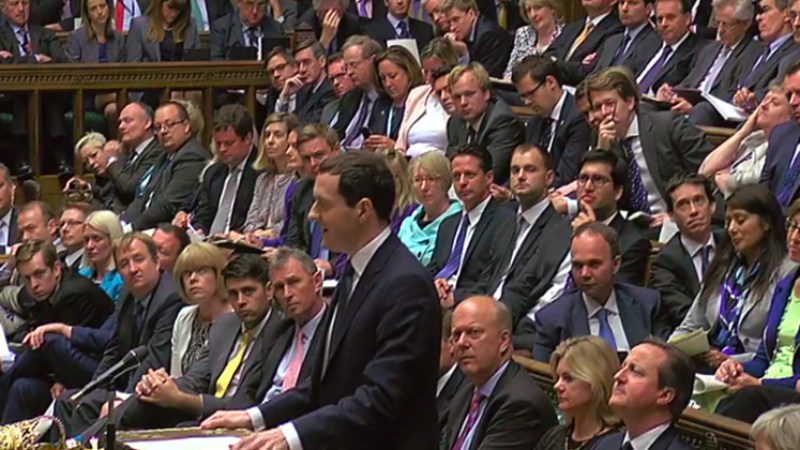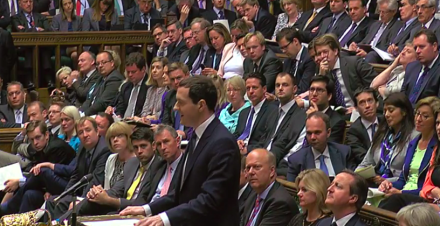

On Wednesday night I voted against George Osborne’s Charter for Budget Responsibility. It was the right thing to do. Being politically inflexible is every bit as wrong as being economically misguided, and to sign up to a Charter that is economically illiterate, intellectually incoherent, and needlessly punitive, would have been a mistake. John McDonnell showed bravery and humility in admitting as much. I’m yet to hear a credible economic voice in support of this new charter.
One place where humility is in perennially short supply is on the SNP benches. Stewart Hosie MP, their Economic Spokesperson, was rightly critical of Osborne’s Charter. But it was clear that he had devoted a lot more time to reading Osborne’s Charter than he had to studying the SNP Government’s own economic proposals, as set out in their alternative Fiscal Mandate published this week.
I know this because, in his opening statement last night, Mr Hosie claimed that “to set out a charter with a fixed target with a fixed timescale…is precisely to remove any flexibility that might be required in the meantime.” Yet a fixed target with a fixed timescale is exactly what the SNP Mandate proposes. It says so in black and white on page 5: “This paper has proposed an option for a fiscal mandate that would achieve a balanced current budget by 2019-20.”
Perhaps Mr Hosie didn’t have time to read the SNP Mandate. This would explain why he was so keen to stress that the SNP had voted against Osborne’s last Charter, which was presented to the House in January, prior to the General Election. If he had, he would have been aware of the eerie similarities between the two.
I asked the independent experts in the House of Commons Library to compare the published SNP Mandate and Osborne’s January Charter and explain the differences between the two. It transpired that there are very few. The Library advice states that Osborne’s January Charter, that the SNP dubbed the “austerity charter”, and the SNP Mandate are “broadly similar”.
Moreover, both Charter and Mandate are “in line with Labour’s commitment to balance the current budget sometime this Parliament – both targets target the current budget, allowing borrowing for investment.”
So has the SNP had a change of heart on the economy?
Back in January, Mr Hosie said that the Charter “sets in stone further draconian cuts” and based their entire general election strategy on such. Then, on 26 May, with the election safely out of the way, Nicola Sturgeon admitted that, far from committing the Government to “£30 billion of welfare cuts”, as the SNP had repeatedly claimed before and during the campaign, Osborne’s January Charter in fact “allows the UK Government flexibility to increase spending over its current plans, while still reducing the deficit and the debt.”
Now the SNP have come full circle. In the opinion of the independent experts in the House of Commons Library, their own Fiscal Mandate, which Mr Hosie lauds as “credible, responsible and fiscally sustainable” is basically the same as Osborne’s January Charter, which he descried in January as “setting in stone further draconian cuts”.
Indeed, the SNP Mandate is arguably the more stringent of the two. Osborne’s January Charter aims to achieve a “cyclically-adjusted current balance”, affording more room for manoeuvre in the event of an economic downturn than the SNP’s Mandate, which takes little account of wider economic circumstances.
To conclude, Osborne’s “draconian” January Charter and the SNP’s “credible” Fiscal Mandate are pretty much the same. There are three possible explanations for why this. One: the SNP did not read the January Charter, or did not understand it. Two: they have had a genuine change of heart on the economy. Three: they wilfully misled the Scottish electorate as to the true nature of the Charter, and its implications for spending and the economy. The First Minister’s comments after the election point to the latter.
So which is it: genuine conversion, incompetence, or downright dishonesty? I have written to Mr Hosie to ask him. I look forward to receiving his response.
Ian Murray MP is the Shadow Secretary of State for Scotland




More from LabourList
‘Labour is being badly misled on housing’
Reeves bets on patience over populism
‘Energy efficiency changes must work for older private renters’